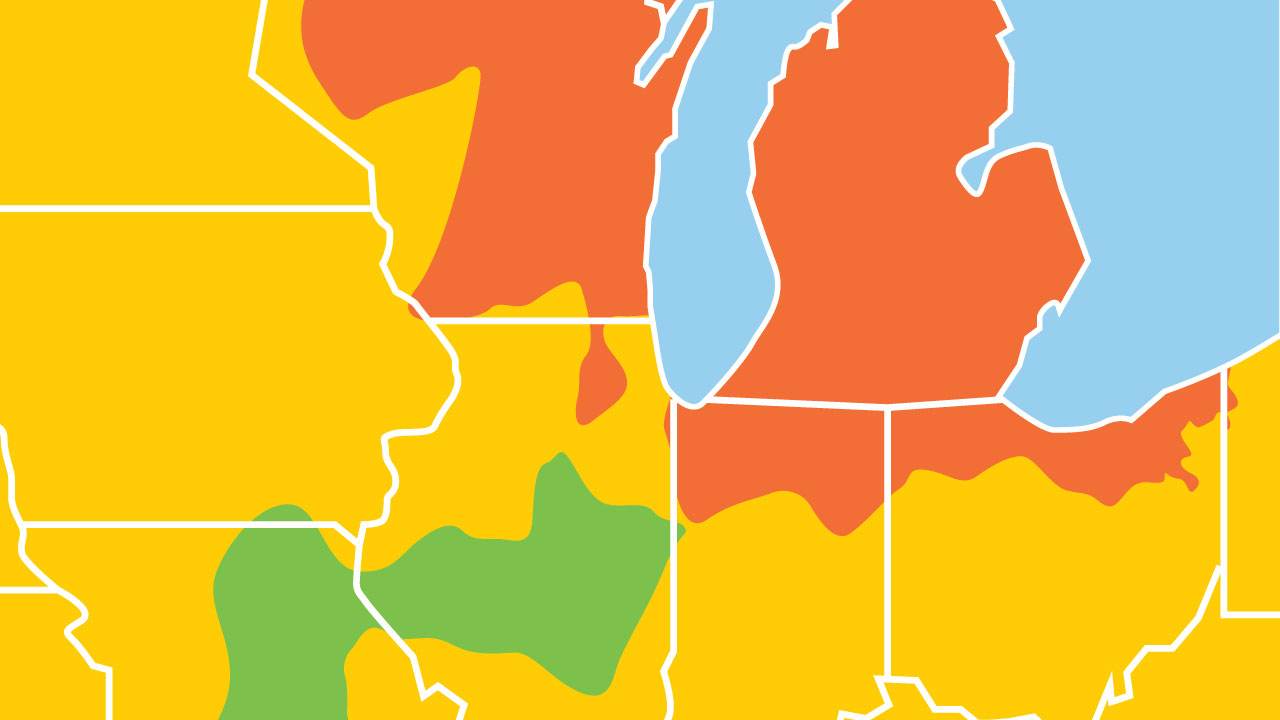Key takeaways:
- Illinois residents are experiencing persistent wildfire smoke impacts, with AQI readings up to 174 and alerts across all 102 counties.
- Congestion, sinus pressure, and restless sleep are common as PM₂.₅ particles mix with preexisting urban and industrial pollution.
- ADVENT helps Illinois patients restore nasal breathing, filtering more irritants before they reach the lungs.
If you’ve stepped outside recently and noticed the skyline swallowed by haze, the air smelling like a campfire, or your breathing feeling more strained than usual, you're not alone. From Chicago’s lakefront to the commuter suburbs and industrial corridors in Rockford, Illinois is dealing with some of the worst air quality in recent memory.
Chicago’s AQI spiked to 174, ranking it among the most polluted cities in the world that day, according to CBS News Chicago. Suburbs like Naperville and Vernon Hills weren’t spared—and neither was Rockford, where warehouse traffic and freight emissions compound the effects of wildfire smoke. On August 1, air quality alerts covered all 102 counties in Illinois. The alerts haven’t stopped, and for many, the symptoms haven’t either.
Why the Wildfire Smoke Seems Worse in Illinois
Wildfire smoke is bad on its own, but in Illinois, our infrastructure and lifestyle make things worse:
- Freight traffic and warehouse activity across northern Illinois raise pollution levels before the smoke even arrives
- Highway congestion and rail yards send particles into the air that mix with wildfire soot
- Lake Michigan’s breeze can hold pollution in place, especially along the shoreline
And during the summer, we’re all spending more time outdoors at festivals, in parks, and along bike trails. Whether you’re walking the dog before work or commuting home with the windows cracked, exposure adds up, and for many, it hits the nose and sinuses first.
How Poor Air Quality Affects Your Nose
Smoke from wildfires carries tiny particles (PM₂.₅) that irritate the lining of your nose and sinuses, and if you already deal with allergies, congestion, or a blocked airway, the symptoms hit harder.
Illinoisans may be dealing with:
- Pressure behind the eyes or across the cheeks
- Dry mouth from mouth breathing
- Shortness of breath or difficulty breathing
- Scratchy throat or post-nasal drip
- Itchiness near the eyes
- Restless sleep or worsened snoring
“For patients with chronic sinus problems, poor air quality can worsen underlying inflammation and block normal sinus drainage,” said Ruben Apgar, NP.
When your nose is blocked or inflamed, it can’t do its job: filtering the air, humidifying it, and protecting your lungs from what’s out there.
Smalls Ways to Protect Your Airways
When alerts go out, as they have repeatedly this summer, the Illinois EPA recommends staying indoors, limiting activity, and paying attention to how your body feels. But when your nose isn’t working properly, you’re vulnerable even inside.
These small adjustments can help:
- Rinse your nose with saline to remove particles and soothe inflammation
- Use a HEPA air purifier, especially where you sleep
- Keep windows closed, particularly if you live near busy roads or industrial zones
- Change HVAC filters to MERV-13 or higher
- Limit outdoor activity, especially during commutes or workouts
- Pay attention to symptoms like worsening congestion or disrupted sleep. They may be a sign it’s time to get help
How ADVENT Makes a Difference
At ADVENT, we specialize in airway-breathing, beginning with your nose. When smoke fills the air, a blocked or inflamed nose makes things worse. That’s where we come in.
With treatments like balloon sinuplasty or turbinate reduction, we help patients restore nasal breathing so your body can do what it’s built to do: filter out irritants before they reach your lungs.
If you’re feeling the effects of wildfire smoke more than others, it may be because your nose isn’t working the way it should. Book an appointment at an ADVENT location in Illinois. We’re ready to help you breathe freely.
References
Apgar R. (2025). Personal interview.
CBS News Chicago. (2025, July 31). Canadian wildfire smoke brings worst air quality in the world to Chicago, creating unhealthy conditions for all. https://www.cbsnews.com/chicago/news/air-quality-chicago-area-canadian-wildfires/
Cleland P. (2025). Personal interview.
Illinois Environmental Protection Agency. (2025, June 4). Chicago Air Pollution Action Day issued for June 5th. https://epa.illinois.gov/content/dam/soi/en/web/epa/about-us/documents/news-releases/2025/06.04.25-IEPA-Chicago-APADs-Final.pdf
Journal-Courier. (2025, August 1). Notice: Illinois residents should avoid strenuous outdoor activities due to air alert. https://www.myjournalcourier.com/news/article/illinois-weather-alert-smoke-fire-20798347.php


